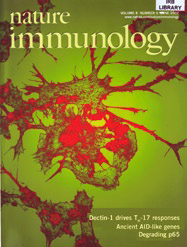on June 12, 2007
L-selectin-negative CCR7– effector and memory CD8+ T cells enter reactive lymph nodes and kill dendritic cells Nature Immunology June 2007.Armed ‘killer’ cells can reenter lymph nodes to destroy dendritic cells – a specialized type of immune cell – according to a report published this week online in Nature Immunology. Such killing by antigen-specific T cells reduces further priming of naive immune cells of similar specificity, thereby preventing excessive immune cell activation.

Nature Immunology Cover June 2007
Nature Immunology, June 2007
The results overturn prevailing notions that lymph nodes provide restrictive environments that prevent entry of activated T cells. Sallusto and colleagues show ‘resting’ lymph nodes continue to bar entry to previously activated immune ‘killer’ cells called effector memory CD8+ T cells. Upon inflammatory signals that occur during infection, however, lymph nodes are activated and transiently express a chemical signal called CXCL9 and recruits memory T cells directly from the bloodstream. These memory cells express a receptor called CXCR3 that recognizes CXCL9.
In addition to checking further immune activation, the CXCL9 entry pathway provides a means to combat pathogens, including viruses such as HIV that replicate in lymph node tissues.The study should also be instructive to those working toward more effective vaccine development and improving efficacy.The work was carried out by Greta Guarda who defended her PhD Thesis,“GENERATION AND FUNCTION OF MOUSE CENTRAL MEMORY AND EFFECTOR MEMORY T CELLS” under the supervision of Federica Sallusto of the IRB and Prof. Hans Acha-Orbea of the University of Lausanne Biochemistry Department the following week.

Federica Sallusto and Greta Guarda







